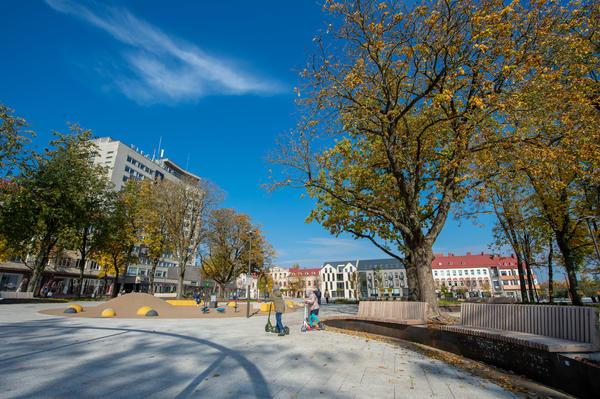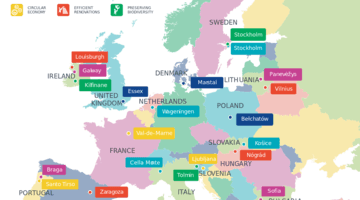Panevėžys (Lithuania)
Summary of the local experiment
The social experiment aimed to enhance the understanding of school communities regarding their role in promoting sustainable mobility in the city. Through co-creation sessions involving relevant stakeholders, collaborative decisions were sought on how school communities could better support the transition to sustainable school mobility in Panevėžys.
Local context
The city of Panevėžys had a modal split of 59% car use, 18% public transport use, 3% cycling, and 20% walking. The three schools participating in the experiment demonstrated varying degrees of sustainable transport usage, ranging from 87% walking (Berzu Progymnasium School) to 50% of students being brought by car (Azuolo Progymnasium School). At the time, the city's strategic documents lacked emphasis on actively involving schools in implementing sustainable mobility concepts. The Panevėžys Sustainable Urban Mobility Plan (SUMP) included only two measures related to promoting sustainable mobility in schools: providing affordable public transport tickets for students and establishing special public transport routes for school transportation.
Specific needs and challenges
To engage young people in the social experiment, innovative and interactive methods were employed. Playful approaches such as field trips, games, online tools, and workshops, as well as ICT tools in "Local Mobility Future Forums," were used to encourage active and creative participation from children. A key challenge was effectively engaging and motivating children to express their opinions and ideas on shaping the city's sustainable mobility.
Detailed description of the experiment
Panevėžys, the fifth largest city in Lithuania, was known for its green and pleasant environment but faced environmental issues like air pollution and high noise levels due to its industrial significance. The city had set goals to combat climate change and developed a Sustainable Urban Mobility Plan (SUMP) in 2017. However, school mobility was problematic, with 45% of children being brought to school by car despite 21 schools being located within a 500m distance from 82% of the children's homes. In contrast, only 20% used public transport, 19% walked, and 3% cycled.
The city's documents at the time did not adequately address the underlying factors contributing to this situation, such as inadequate bicycle infrastructure, traffic safety issues, and inefficient public transportation. Additionally, there was a lack of consistent education and capacity development for school children regarding sustainable mobility in Lithuania.
The social experiment aimed to understand the role of school communities in Panevėžys' sustainable mobility system and sought to empower young people to contribute their voices to the process. Through a series of co-creation sessions, relevant stakeholders actively collaborated to identify common solutions for better supporting sustainable school mobility in the city. The overall objective was to increase the number of sustainable journeys and improve the safety and health aspects of school mobility. Additionally, the experiment sought to expand the knowledge base on climate change actions within the municipality and enable the voices of young people to contribute to the development of local policy recommendations.
Local engagement
The experiment targeted school communities, including school children aged 10-16, parents, and teachers. School children, considered influential in shaping the behaviours of their peers, parents, and teachers, actively participated and were directly affected by current mobility policies.
Partners
The experiment collaborated closely with various local partners, including:
- Relevant departments of Panevėžys Municipality, such as the Education and Youth Affairs Department, City Infrastructure Department, and Territorial Planning and Architecture Department, as well as politicians involved in urban mobility planning.
- Local NGOs and bicycle organizations that supported the municipality and communities in making sustainable decisions.
- Panevėžys City Transport Company and the police, responsible for local public transportation and traffic safety.
- Panevėžys City Municipality Public Health Bureau, which focused on shaping a safe and healthy environment for the city community.
Local partner
Environmental Center for Administration and Technology (ECAT)
Country
Lithuania
Number of inhabitants
87,590
City
Panevėžys
Website/social media
Contact person:
Lina Gelaziene, Directorlina [at] ecat [dot] lt
Jun-Jul 2023
Synthesis Forum
Jul-Sep 2023
Fields of Action Forum
Sep-Oct 2023
Youth Mobility Policy Forum
Oct 2023
Study Tour (Sofia)
Oct-Nov 2023
Youth Design Forum I
Nov-Dec 2023
Youth Design Forum II
Jan-Feb 2024
Final Forum
Related Green Deal Priorities


CONTACT
For further details please contact co-leads Professor Chris Foulds (chris.foulds@aru.ac.uk) and Professor Rosie Robison (rosie.robison@aru.ac.uk).

This project has received funding from the European Union’s Horizon 2020 research and innovation program under grant agreement No 101036640. The sole responsibility for the content of this website lies with the SHARED GREEN DEAL HAS project and does not necessarily reflect the opinion of the European Union.

